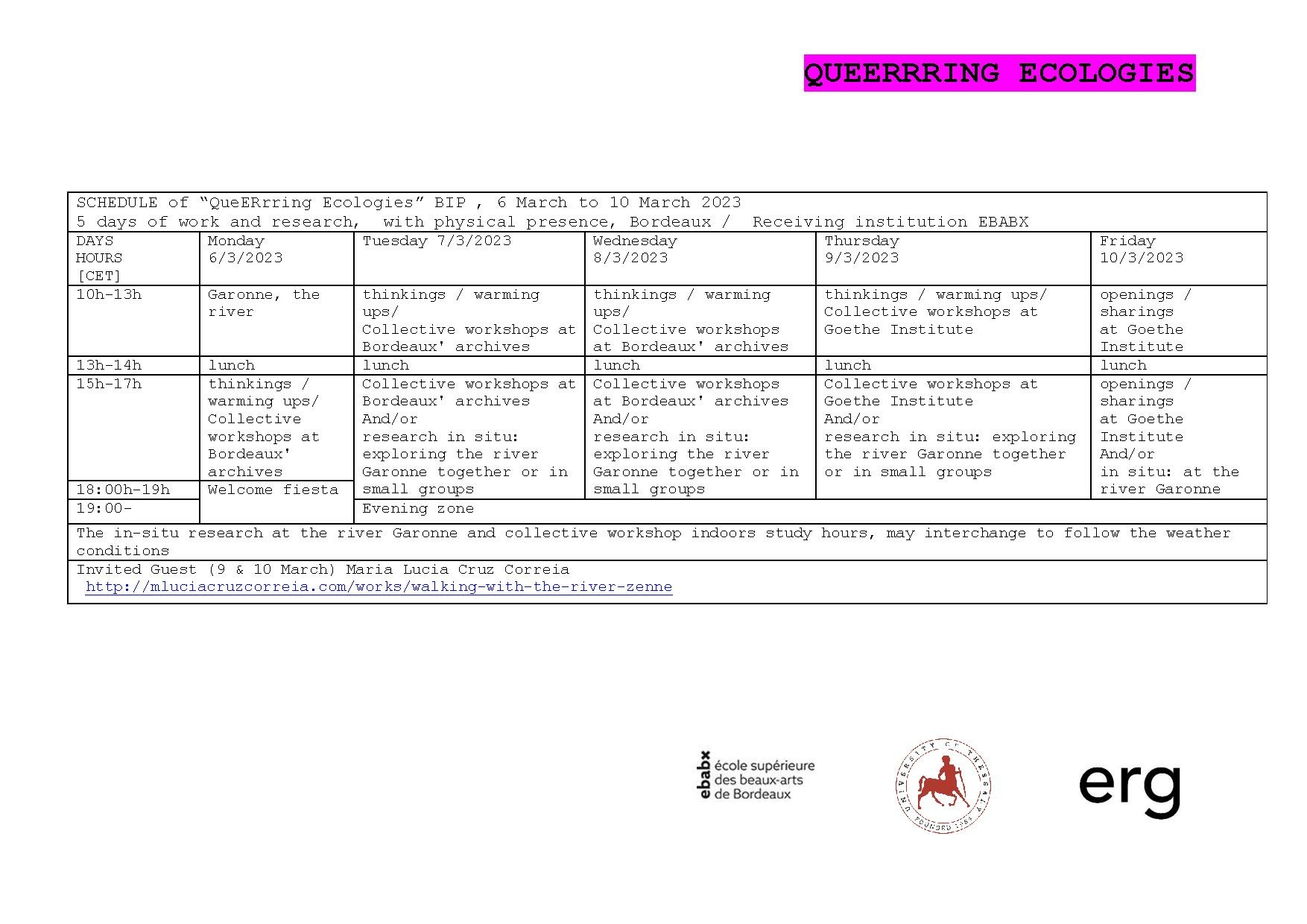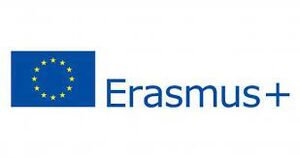Queerrring ecologies : Différence entre versions
De erg
(→QueerRring Ecologies) |
|||
| Ligne 11 : | Ligne 11 : | ||
La collaboration (9 étudiant.es et 2 enseignant.es par école), administrativement légère et tenue notamment par l’envie de continuer à travailler ensemble, évoluera initialement à distance en amont et en aval de chaque rencontre annuelle, qui durera une semaine et aura lieu dans une des trois institutions impliquées à tour de rôle. Pour la première année, c’est Bordeaux, qui initie le projet, qui accueillera les deux autres écoles, du 6 au 10 mars 2023. | La collaboration (9 étudiant.es et 2 enseignant.es par école), administrativement légère et tenue notamment par l’envie de continuer à travailler ensemble, évoluera initialement à distance en amont et en aval de chaque rencontre annuelle, qui durera une semaine et aura lieu dans une des trois institutions impliquées à tour de rôle. Pour la première année, c’est Bordeaux, qui initie le projet, qui accueillera les deux autres écoles, du 6 au 10 mars 2023. | ||
| + | |||
| + | ----------------------------------------------------------------------------------------------------------------- | ||
| + | |||
| + | This project allows us to build a dynamic triangle between three schools: the ebabx in Bordeaux (France, ebabx.fr), the erg in Brussels (Belgium, erg.be) and the Department of Architecture of the University of Thessaly (Greece, arch.uth.gr/en). Through this triangulation, we wish to think and create together in an extended, held and flexible pratico-theoretical context, which we could call QueerRring Ecologies. Although they will, of course, be defined through the joint work, the general lines of the project could quickly take shape as follows: | ||
| + | |||
| + | What is ecology in a world, and a Europe, bruised by patriarchal capitalism, and the ecological imbalances that it imposes on all life in view of its own expansion? How can we resist the injustices, the inequalities but also the habits that weigh on the bodies of living beings in a world dominated by racism, speciesism, sexism and the impoverishment of the greatest number? We live in a world where the surveillance of all things, animate or inanimate, is becoming normalized. In the name of European borders, serious human rights violations are committed every day, at the same time as economic globalization forces an unprecedented rate of imports and exports of goods. As privileged people, as artists and/or architects who live in different European cities and countries but in this same world, how can we think and do together in this context? How can we disrupt existing patterns and become stronger, more capable of resisting together through the practice of the commons and the collective, through art and the re-architecting of our ways of living? A very first answer, or desire, would be this: we resist by meeting, by creating links, by thinking, by celebrating and working together, by making together stories, works and experiences that count, by making collective between countries, at a distance and on the spot. We are all alive but not in the same way. We will all die, but not in the same way. The heritage of several centuries of extractivist anthropocentrism and phallocentrism (whether to extract labor, children, oil or digital data) prevent the harmonious coexistence of life of all kinds, be it plant, animal or mineral. We are all Europeans but not in the same way. Europe itself is not the same Place de la Concorde in Paris and Place de la Concorde (Ομόνοια) in Athens, it is not the same at the Parvis Saint-Gilles market, where cultures mix happily, and the Europa building, where the financial heart of the European Union beats. | ||
| + | |||
| + | The collaboration (9 students and 2 teachers per school), administratively light and held together by the desire to continue working together, will initially evolve at a distance before and after each annual meeting, which will last one week and take place in one of the three institutions involved in turn. For the first year, Bordeaux, which is initiating the project, will host the other two schools, from March 6 to 10, 2023. | ||
[[Fichier:Daily-PROGRAMME- QueERrring Ecologies20230223-logos.pdf]] | [[Fichier:Daily-PROGRAMME- QueERrring Ecologies20230223-logos.pdf]] | ||
[[Fichier:Logoerasmus+.jpg|vignette]] | [[Fichier:Logoerasmus+.jpg|vignette]] | ||
Version du 24 mai 2023 à 15:05
QueERrrring EcologiEs is a Blended Intensive Programme - Erasmus that allows for a 3-year research about ecological injustice and emergency and how the arts can respond to it, between ebabx Bordeaux (FR), erg Brussels (BE) & Department of architecture, UTH University of Τhessaly (GR).
QueerRring Ecologies
Ce projet permet de construire un triangle dynamique entre trois écoles : l’ebabx à Bordeaux (France, ebabx.fr), l’erg à Bruxelles (Belgique, erg.be) et le département d’Architecture de l’Université de Thessalie (Grèce, arch.uth.gr/en). Par cette triangulation, nous souhaitons penser et créer ensemble dans un contexte pratico-théorique étendu, tenu et souple à la fois, qu’on pourrait appeler QueerRring Ecologies. Même si elles seront, bien évidemment, définies à travers le travail commun, les lignes générales du projet pourraient rapidement se dessiner de la façon suivante :
Qu’est-ce que l’écologie dans un monde, et une Europe, meurtri.es par le capitalisme patriarcal, et les déséquilibres écologiques qu’en vue de sa propre expansion celui-ci impose à toute vie ? Comment peut-on résister aux injustices, aux inégalités mais aussi aux habitudes qui pèsent sur les corps des êtres vivants dans un monde dominé par le racisme, le spécisme, le sexisme et l’appauvrissement du plus grand nombre ? Nous vivons en effet dans un monde où la surveillance de toute chose, animée ou inanimée, est en train de se normaliser. Au nom des frontières européennes sont commises chaque jour de graves violations des droits humains au même moment où la globalisation économique oblige à un taux d’importations et d’exportations de marchandises sans précédent. En tant que personnes privilégiées, en tant qu’artistes et/ou architectes qui vivent dans des villes et des pays européens différents mais dans ce même monde, comment pouvons-nous penser et faire ensemble dans ce contexte ? Comment pouvons-nous déranger les schémas existants et devenir plus fort.es, plus capables de résister ensemble via la pratique des communs et du collectif, via l’art et la ré-architecturation de nos manières de vivre ? Une toute première réponse, ou envie, serait celle-ci : on résiste en se rencontrant, en créant des liens, de la pensée, en faisant la fête et en travaillant en commun, en fabriquant ensemble des récits, des travaux et des expériences qui comptent, en faisant collectif entre pays, à distance et sur place. Nous sommes toustes vivant.es mais pas de la même manière. Nous mourrons toustes mais pas de la même manière. Le patrimoine de plusieurs siècles d’anthropocentrisme et de phallocentrisme extractivistes (qu’il s’agisse d’extraire du travail, des enfants, du pétrole ou des données numériques) empêchent la coexistence harmonieuse de la vie en tous genres, qu’elle soit végétale, animale ou minérale. Nous sommes toustes Européen.nes mais pas de la même manière. L’Europe elle-même n’est pas la même Place de la Concorde à Paris et Place de la Concorde (Ομόνοια) à Athènes, elle n’est pas la même au marché du Parvis Saint-Gilles, où les cultures se mélangent allègrement, et au bâtiment Europa, où bat le cœur financier de l’Union Européenne.
La collaboration (9 étudiant.es et 2 enseignant.es par école), administrativement légère et tenue notamment par l’envie de continuer à travailler ensemble, évoluera initialement à distance en amont et en aval de chaque rencontre annuelle, qui durera une semaine et aura lieu dans une des trois institutions impliquées à tour de rôle. Pour la première année, c’est Bordeaux, qui initie le projet, qui accueillera les deux autres écoles, du 6 au 10 mars 2023.
This project allows us to build a dynamic triangle between three schools: the ebabx in Bordeaux (France, ebabx.fr), the erg in Brussels (Belgium, erg.be) and the Department of Architecture of the University of Thessaly (Greece, arch.uth.gr/en). Through this triangulation, we wish to think and create together in an extended, held and flexible pratico-theoretical context, which we could call QueerRring Ecologies. Although they will, of course, be defined through the joint work, the general lines of the project could quickly take shape as follows:
What is ecology in a world, and a Europe, bruised by patriarchal capitalism, and the ecological imbalances that it imposes on all life in view of its own expansion? How can we resist the injustices, the inequalities but also the habits that weigh on the bodies of living beings in a world dominated by racism, speciesism, sexism and the impoverishment of the greatest number? We live in a world where the surveillance of all things, animate or inanimate, is becoming normalized. In the name of European borders, serious human rights violations are committed every day, at the same time as economic globalization forces an unprecedented rate of imports and exports of goods. As privileged people, as artists and/or architects who live in different European cities and countries but in this same world, how can we think and do together in this context? How can we disrupt existing patterns and become stronger, more capable of resisting together through the practice of the commons and the collective, through art and the re-architecting of our ways of living? A very first answer, or desire, would be this: we resist by meeting, by creating links, by thinking, by celebrating and working together, by making together stories, works and experiences that count, by making collective between countries, at a distance and on the spot. We are all alive but not in the same way. We will all die, but not in the same way. The heritage of several centuries of extractivist anthropocentrism and phallocentrism (whether to extract labor, children, oil or digital data) prevent the harmonious coexistence of life of all kinds, be it plant, animal or mineral. We are all Europeans but not in the same way. Europe itself is not the same Place de la Concorde in Paris and Place de la Concorde (Ομόνοια) in Athens, it is not the same at the Parvis Saint-Gilles market, where cultures mix happily, and the Europa building, where the financial heart of the European Union beats.
The collaboration (9 students and 2 teachers per school), administratively light and held together by the desire to continue working together, will initially evolve at a distance before and after each annual meeting, which will last one week and take place in one of the three institutions involved in turn. For the first year, Bordeaux, which is initiating the project, will host the other two schools, from March 6 to 10, 2023.

